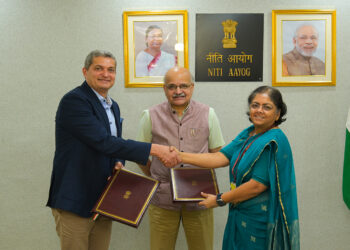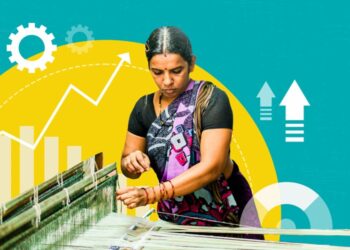In the past one year, during the pandemic, Tata Trusts’ Tata Water Mission (TWM), under its Menstrual Hygiene Management (MHM) programme, significantly raised MHM awareness by successfully training 58,521 Women, 22,774 Girls and 704 Men and Boys, across 8 States—Assam, Gujarat, Jharkhand, Karnataka, Maharashtra, Rajasthan, Uttar Pradesh, and Uttarakhand.
The MHM programme, with its Social Behavior Change Communications (SBCC) campaign, offered a holistic approach towards empowering women and destigmatising MHM, by building conversations around menstruation among schools and communities. Additionally, the mission organised sensitization workshops and trainings for healthcare and Anganwadi professionals.
This was following Dasra’s 2016 baseline survey, conducted in rural India, which revealed how 70% mothers considered menstruation ‘dirty’, perpetuating a culture of silence. The National Family Health Survey 2015-16 too highlighted the vulnerabilities of rural India’s menstruating population by highlighting that only 48% of those surveyed used hygienic menstrual products.
Divyang Waghela, Head – WaSH, Tata Trusts, said, “The Tata Water Mission aims to improve the quality of life of rural underserved communities by improving sanitation and hygiene services, and providing them safe, assured and adequate drinking water.
One of the critical elements of our mission is to provide dignity to women through provision of knowledge and information for safe and improved menstrual hygiene practices by adopting a holistic value-chain approach — starting from creating awareness to provide choices for improved absorbents to appropriate disposal mechanism.”
He further noted, “Ownership of the community is pivotal in ensuring sustainability of our interventions. In the MHM programme, we have created local champions at the community level, which not only creates awareness using inclusive well-designed communication tools, but also drives collective action by bringing all stakeholders together to break the silence around discussion on menstruation. Our goal is not to offer prescriptions but guide local communities to understand the problem and build their capabilities — so that they might seek solutions on their own. This builds sustainability into the programme.”
Undeterred by Covid-19, TWM continues to shoulder the responsibility of reducing such vulnerabilities of women and adolescents in remote rural areas.
Leveraging the MHM value chain, the programme, with its 360-degree approach, persists to unfold its four integral pillars in the country:
Pillar 1: School and Community level Interventions for Women & Adolescent Girls
Community Resource Persons — (popularly known as Sakhis) — mobilise women and girls to promote conversation about MHM aspects, like reproductive system, menstrual products, PMS and Menopause, nutrition essentials, and associated myths. Thus, helping them make informed choices by learning, not only about the existence of menstruation but its causes too.
To ensure accurate delivery of key information on awareness, use, and hygiene and to sustain improved practices among beneficiaries, TWM has developed digital tools and communication materials as mentioned below:
‘Samajhdar’ Campaign – 9 MHM Digitised Videos
It uses behavioral science to trigger positive behavior among communities. The beneficiaries connect with the ‘Samajhdar’ characters emotionally and retain key learnings due to positive reinforcement.
Creation of a CRP Handbook
It aids the facilitator with participatory tools during session delivery and makes the learning process interesting without missing out any key Information.
Beneficiary Handbook
It is an infotainment comic-cum-handbook designed to help beneficiaries understand MHM through attractive and colorful illustrations and simple and relatable story. Thus, enhancing retention of key learnings and offering a point of reference for the information shared during sessions.
To make discussion on menstruation normal, interactive fun games and story-telling process helped in bridging the gap among participants.
Pillar 2: Intervention with Males (Adolescent Boys and Couple Counselling)
It attempts to break the barriers of communication and taboos regarding menstruation among adolescent boys and men. Being important stakeholders, equipping them with scientific knowledge about MHM becomes important, such that they can extend a supportive socio-cultural environment for women and girls in making informed MHM decisions.
Couples’ counseling is key in improving informed MHM decision making among women, with their husband’s/father’s support, as it helps in initiating conversations on such a stigmatized subject in a patriarchal setup.
Men learn about the right MHM practices and provide a supportive socio-cultural environment for women around them.
Pillar 3: Setting up Sustainable Supply Chain for Eco-friendly products
While many women use cloth and sanitary napkins, most are unaware of the range of products available in the market. This module emphasizes on such varying products and their pros and cons, thus, empowering women to make informed decisions. A supply chain involving local Self Help Groups (SHGs) and federations is also developed to offer access to good quality, eco-friendly menstrual absorbents. This also helps to explore new avenues of livelihood generation among entrepreneur women.
To improve accessibility, availability, affordability, and safe and hygienic use of MHM products during the pandemic, MHM Team has been working on the following:
How to stich your own Cloth Pads Workshops
The programme encourages and empowers women with skills to stitch their own cloth pads at home.
DIY Cloth Pad Stitching Video
To better reach during pandemic and to make women self-reliant in managing their menstruation with safety and dignity, TWM team helped create an animated video on ‘How to stich your own Cloth Pad’ which is now circulated among beneficiaries through social media channels.
Cloth Pad Production Units
To make women self-reliant in addressing their growing need for reusable menstrual hygiene products a pilot of the Cloth Pad Entrepreneurship Module was established in Uttar Pradesh in May 2020. On achieving success, next units were set up in Baharaich, Rajasthan & Nashik. Upcoming units in Assam, Maharashtra (Nashik, Nandurbar & Amravati) & Gujarat are in planning phase.
Pillar 4: Safe Disposal of Sanitary Waste
The programme has been promoting only reusable products with accurate disposal techniques to ensure safe disposal of the used absorbents. For beneficiaries, using non-reusable, disposable products, the use of 1029 local Matka Incinerators have been promoted with great success across geographies. This programme also emphasises on R&D efforts for innovative disposal technologies.
With these pillars, the Tata Trusts facilitates—crushing menstrual inequity; bringing menstruation out of the shackles of stigma; and building an India where menstruation is synonymous to safety and dignity.
The Tata Trusts
Since inception in 1892, Tata Trusts, India’s oldest philanthropic organisation, has played a pioneering role in bringing about an enduring difference in the lives of the communities it serves. Guided by the principles and the vision of proactive philanthropy of the Founder, Jamsetji Tata, the Trusts’ purpose is to catalyse development in the areas of health, nutrition, education, water, sanitation and hygiene, livelihood, digital transformation, migration and urban habitat, social justice and inclusion, environment and energy, skill development, sports, and arts and culture. The Trusts’ programmes, achieved through direct implementation, partnerships and grant making, are marked by innovations, relevant to the country.
(24 June, 2021/India CSR Network)





















